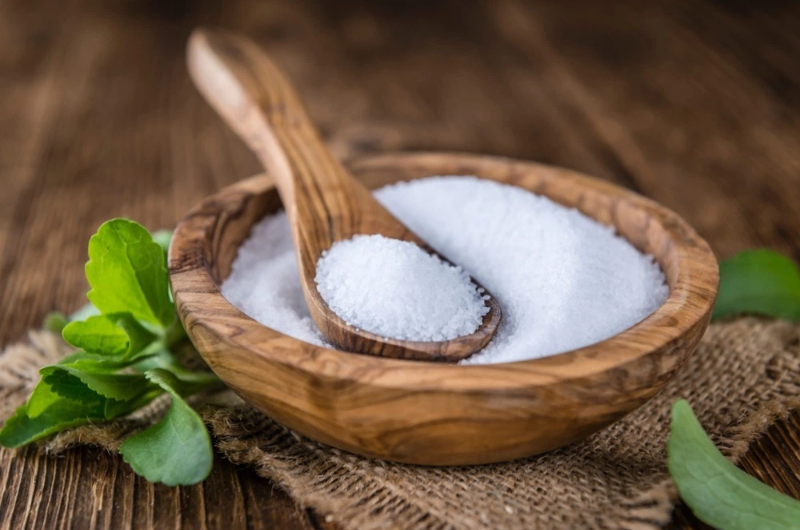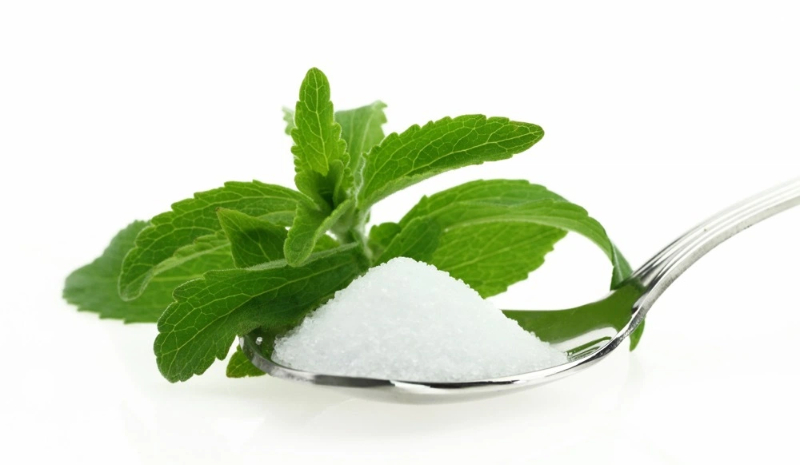







Content Menu
● What is Stevia? A Natural Sweetening Wonder
● History of Stevia Regulation in Europe
>> EFSA's Regulatory Framework for Stevia in Europe
● Benefits of Stevia Use in Europe
● Common Concerns and Scientific Perspectives
>> Allergies and Sensitivities
● Comparison: Stevia Status in Europe vs. Other Regions
● Emerging Trends and Future Outlook
● Frequently Asked Questions (FAQ)
>> 1. Is Stevia banned in Europe?
>> 2. Which forms of stevia are permitted in Europe?
>> 3. Are there any health concerns with using stevia?
>> 4. How is stevia labeled on European food products?
>> 5. Can stevia be used in all food and beverage categories?
Stevia, a natural sweetener derived from the leaves of the Stevia rebaudiana plant, is not banned in Europe. Instead, it is a regulated and approved ingredient widely used under strict conditions as set by the European Food Safety Authority (EFSA). This article will explore the history, regulation, benefits, and considerations of stevia in Europe, complemented by detailed explanations to deepen understanding. The article concludes with a FAQ section to clarify common questions.

Stevia is a natural, zero-calorie sweetener extracted from the leaves of the South American plant Stevia rebaudiana. Indigenous communities in Paraguay and Brazil have used it for centuries to naturally sweeten foods and beverages. The sweetness comes primarily from compounds called steviol glycosides, with Rebaudioside A (Reb A) being the most common and commercially significant. These compounds are up to 400 times sweeter than sugar but contribute no calories, making stevia a popular choice for those managing weight or blood sugar levels.
Stevia's natural origin and intense sweetening power have made it a sought-after alternative to artificial sweeteners and sugar. Unlike many synthetic sweeteners that some consumers avoid due to concerns about chemical additives, stevia offers a plant-based option with a long history of traditional use. This has also helped boost its popularity as consumers tend to be more accepting of "natural" products.
Initially, stevia leaves and some crude extracts were not approved in Europe due to lack of comprehensive safety data and concerns over potential health effects. Unlike other regions such as Japan and South America, where stevia had been widely in use for decades, the European Food Safety Authority (EFSA) adopted a cautious approach.
In 2011, EFSA approved highly purified steviol glycosides for use as food additives (identified with E numbers such as E960a), after thorough safety assessments that included toxicological and metabolic studies. The approval explicitly restricts the forms of stevia allowed—only purified extracts and not raw leaves or crude extracts are permitted to ensure consumer safety. This regulatory decision was based on rigorous scientific evaluation and reflects a balance between consumer protection and enabling access to innovative food ingredients.
This approval marked a significant milestone, allowing the food and beverage industries in Europe to incorporate stevia extracts into many products as a natural sweetener alternative to sugar and synthetic sweeteners.
EFSA maintains a detailed regulatory framework governing the use of stevia in foods and drinks:
- Maximum Permitted Levels (MPLs) are specified per product category to limit total daily intake and avoid excessive consumption.
- Only approved forms of steviol glycosides, such as purified Rebaudioside A and Stevioside, may be used. Raw leaves, whole leaf stevia, and crude extracts remain prohibited due to insufficient safety data.
- Labeling requirements mandate that stevia's presence is clearly declared on packaging using terms such as "stevia," "steviol glycosides," or the E number "E960" to enable consumer transparency.
Examples of MPLs include limits in beverages, confectionery, dairy products, and table-top sweeteners. This ensures stevia can be safely used across a variety of food applications while preventing excessive intake.
The stringent regulation helps build consumer confidence in stevia-sweetened products by guaranteeing a high purity standard and safeguarding health.

Stevia offers several important health benefits that align with current global public health priorities:
- Calorie-free sweetness: Stevia provides intense sweetness without the calories found in sugar, which assists weight management and calorie reduction efforts.
- No impact on blood glucose: Stevia does not raise blood sugar, making it especially suitable for people with diabetes or those at risk of developing it.
- Natural origin: Many consumers prefer stevia over synthetic sweeteners due to its plant-based nature and long history of use.
- Dental health: Unlike sugar, stevia does not contribute to tooth decay, supporting dental health.
These attributes make stevia a valuable ingredient for food manufacturers aiming to meet consumer demand for healthier, lower-sugar options.
The EFSA's approval has spurred a significant expansion of stevia use within the European food and beverage markets. Manufacturers use stevia to formulate sugar-reduced products in categories such as:
- Soft drinks and sparkling waters
- Flavored dairy and plant-based milk products
- Confectionery including chewing gum and chocolates
- Bakery items and snacks
- Table-top sweeteners for direct consumer use
This helps the industry address regulations and public health initiatives aimed at reducing sugar consumption. By using stevia, companies can offer products that satisfy consumer preference for sweetness while meeting nutritional goals.
The growth of stevia also supports innovation and diversification of product portfolios, providing competitive advantage in an increasingly health-conscious market.
While stevia is broadly recognized as safe, some consumers remain cautious due to concerns about potential side effects or adverse reactions.
Some individuals report mild digestive discomfort such as bloating or gas. However, such effects are usually linked to sugar alcohols or other sweeteners that may be combined with stevia in products, rather than stevia itself. Pure steviol glycosides are generally well tolerated.
There are very few reports of allergic reactions or sensitivities to stevia, and it is not considered a common allergen.
Extensive evaluations by EFSA confirm that stevia is safe when consumed within the established Acceptable Daily Intake (ADI) levels. The ADI is set at 4 mg/kg body weight per day of steviol glycosides. Careful adherence to regulated amounts ensures that stevia can be consumed safely over the long term.
Ongoing studies continue to monitor health outcomes, metabolic effects, and any new data to maintain regulatory oversight.
The global regulatory landscape for stevia highlights differing historical approaches but increasing acceptance of purified steviol glycosides:
| Region | Status on Stevia |
|---|---|
| Europe | Approved in purified form; regulated by EFSA |
| United States | Approved by FDA for use in foods and beverages |
| Japan | Long history of use; fully approved and widely used |
| South America | Traditional use; no restrictions on raw leaves |
| Other Asian Countries | Approved with certain restrictions |
| Some Countries | Ban or restriction on crude or unapproved forms |
Europe's regulatory stance aligns with that of the US and Japan in permitting purified extracts, contributing to a harmonized global market for stevia-containing products. The prohibition of raw leaves or crude extracts in Europe is largely due to concerns about impurities and inconsistent compositions.
With ongoing public health campaigns focusing on sugar reduction, stevia's role in the marketplace is expected to grow further. Advances in plant breeding have also led to new stevia variants with improved taste profiles, addressing some lingering consumer concerns about bitterness or aftertaste.
Research on stevia's wider health impacts, including antioxidant properties and potential metabolic benefits, continues to expand. This may open opportunities for stevia to be used in functional foods or medical nutrition applications, especially relevant to diabetes and cardiovascular health.
The European food industry is investing in new product development using stevia blends with other sweeteners to optimize sweetness, cost, and taste profiles, enhancing consumer acceptability.
Stevia is not banned in Europe. It is a regulated, approved natural sweetener under EFSA's thorough safety assessments and strict guidelines. The approved use of purified steviol glycosides enables manufacturers to offer consumers a natural, calorie-free sugar alternative across diverse food and beverage categories. Stevia's health benefits, particularly related to weight management and blood glucose control, align with growing public demand for healthier products. Responsible consumption within established limits ensures safety and efficacy, making stevia a valuable ingredient in Europe's food and beverage landscape.

No. Stevia is approved in Europe in purified forms regulated by EFSA under strict guidelines.
Only purified steviol glycosides such as Rebaudioside A, with designated E numbers (e.g., E960a), are allowed. Raw leaves, whole leaf stevia, and crude extracts are banned due to safety concerns.
Stevia is generally safe. Some individuals may experience mild digestive issues, but scientific evaluations confirm its safety within the authorized intake limits.
Products containing stevia must clearly disclose it on packaging using terms like "stevia," "steviol glycosides," or the E number "E960" to ensure consumer transparency.
EFSA permits stevia in many categories but sets maximum permitted levels per category to protect consumers by limiting overall intake.
Top Nutritional Supplement Manufacturers And Suppliers in Indonesia
Top Nutritional Supplement Manufacturers And Suppliers in India
Top Nutritional Supplement Manufacturers And Suppliers in Germany
Top Nutritional Supplement Manufacturers And Suppliers in France
Top Nutritional Supplement Manufacturers And Suppliers in Canada
